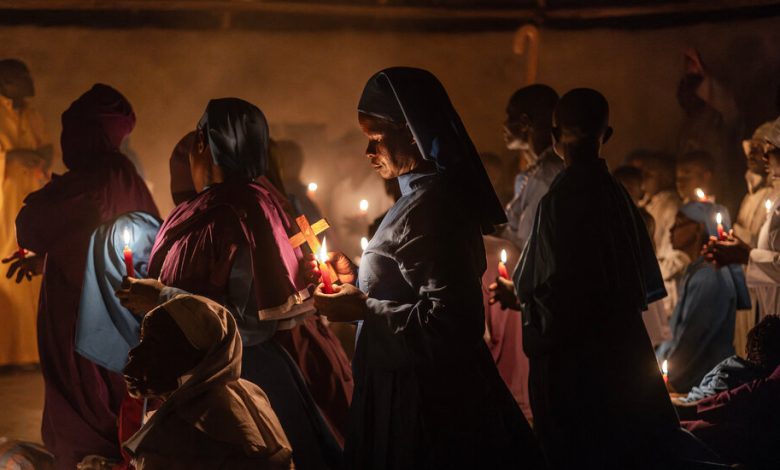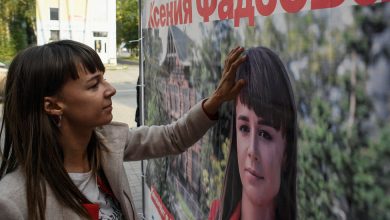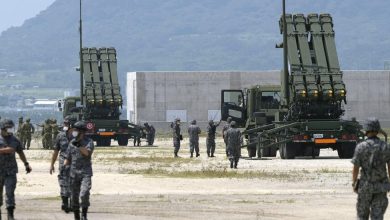Blessing of Same-Sex Couples Rankles Africa’s Catholics

The Vatican’s recent declaration allowing the blessing of same-sex couples caused a stir around the globe, but perhaps most of all in Africa, a rising center of the Roman Catholic Church’s future. In one statement after the next, bishops in several countries spoke of the fear and confusion the declaration has caused among their flocks, and said it was out of step with the continent’s culture and values.
The bishops also harbored a deeper fear: that in a place where the church is growing faster than anywhere else in the world, and where many forms of Christianity are competing for worshipers, the declaration could slow the church’s expansion on the continent.
Bishop John Oballa of the Ngong Diocese near Nairobi said that a woman had written to him saying that a friend told her he wanted clarification on the declaration, or else he would convert to the Methodist Church.
“There’s a lot of vibrancy in many, many dioceses of Africa,” Bishop Oballa said in an interview. “We need to safeguard against anything that might derail that growth.”
He said he would advise his priests to give blessings to same-sex couples only if they were seeking God’s strength in helping “to stop living in same-sex unions.”
But if the couple merely wanted a blessing and planned to continue living the way they were, “it may give the impression of recognition,” he said, adding that he would advise clergy “not to bless because it may be scandalous to others — it may weaken the faith of others.”
This past week, the Vatican sought to placate those bishops alarmed by the new rule, saying that allowances should be made for “local culture,” but that it would remain church policy. Bishops opposed to the change, it said in a statement, should take an “extended period of pastoral reflection” to wrap their heads around why the Vatican says the blessing of same-sex couples is in keeping with church teaching.
Home to 236 million of the world’s 1.3 billion Catholics, Africa accounted for more than half of the 16.2 million people who joined the church worldwide in 2021. As bishops and other church leaders on the continent deal with the fallout among their parishioners over the declaration, broader concerns have been raised about whether it could lead to a rift between Pope Francis and a region that is a demographic bright spot for Catholicism.
“I think there is a rebellion already that’s started to say, ‘We’re not going implement this,’” said Father Russell Pollitt, the director of the Jesuit Institute South Africa, referring to the responses of bishops across the continent.
Some African clergy said they expected the Vatican and church leaders in Africa to work through their differences. But the declaration has complicated the relationship and will force difficult conversations between the church’s central authority and its African leaders. Some bishops have even hinted at a split between the values of African nations and the West, where some clergy had for years been running afoul of the Vatican’s guidance by blessing same-sex unions.
“In our African context, while recognizing the confusion existing in the more developed countries of new, unchristian models of ‘conjugal union’ and ‘styles of life,’ we are very clear on what a family and marriage is,” said a statement from the Kenya Conference of Catholic Bishops.
Without exception, church leaders in Africa have emphasized to their flocks that the declaration approved by Francis was explicit in saying that marriage remained a union between a man and a woman. They have stressed that the church’s doctrine on marriage has not changed, and that the declaration is about blessing the individuals, not their relationships.
Bishops in Malawi and Zambia have already said that, to avoid confusion, their clergy would be instructed not to give blessings to same-sex couples. The Catholic Bishops Conference of Nigeria did not take a firm position on the issue, and said in a statement that “asking for God’s blessing is not dependent on how good one is.” But it added that there was “no possibility in the church of blessing same-sex unions and activities,” a nod to the declaration’s nuance of blessing gay individuals not relationships.
The Southern African Catholic Bishops’ Conference affirmed that distinction in its statement. But it went further in saying that the church’s position was that “all people, regardless of their sexual orientation, must be treated with the dignity that they deserve as God’s children, made to feel welcome in the church, and not be discriminated against or harmed.”
The Vatican’s declaration has laid bare a tension for the church in Africa: How can it welcome homosexuals while not upsetting believers who stand firmly behind the church’s teaching that homosexuality is a sin?
Some African church leaders feel strongly that they should not even talk about homosexuality “because it is un-African,” said Bishop Sithembele Sipuka of the Mthatha Diocese in South Africa, who is also the president of the Southern African conference. Others, he added, felt differently because they personally knew gay people. “It is not our experience that it’s this thing they got from Europe,” he said.
His conference has interpreted the declaration to mean that people in same-sex relationships can be blessed, he said, but individually and not presented together.
Months before the Vatican’s declaration, Bishop Martin Mtumbuka of the Karonga Diocese in Malawi delivered a fiery sermon accusing Western pastors of trying to bend the word of God to accept homosexuals as a way of attracting a larger pool of priests and other religious vocations.
“Any one of us pastors who champions this is just being heretical and fooling himself,” Bishop Mtumbuka said, according to an audio recording of the sermon, which circulated widely on social media after the Vatican’s declaration.
Francisco Maoza, 48, a parishioner who lives in Malawi’s capital, Lilongwe, said he was relieved when his country’s bishops said they would not permit blessings for same-sex couples.
“I still think the position by the pope is wrong,” said Mr. Maoza, a carpenter. “In the African context, even in Malawian culture, we don’t allow men and women to marry people of their own sex. So why should priests be allowed to bless such unions?”
Another Catholic in Malawi, Josephine Chinawa, said she felt that Francis needed to step down because of the declaration.
“I really couldn’t understand his motivation,” she said. “Maybe he is too old.”
However, Father Pollitt said that some church leaders in Africa were being hypocritical. While they severely criticize homosexuality, he said, they say little about other “irregular unions” identified in the Vatican’s declaration, such as unmarried heterosexual couples who live together. The document says that priests can bless them, too. There have also been many cases on the continent of priests breaking celibacy rules by having children, but that does not get the same scrutiny among church leaders, he said.
“Let’s face facts: There is a lot of homophobia in Africa,” Father Pollitt said.
How the controversy over the blessing of same-sex couples plays out in the long run in Africa remains an open question. Some analysts say there may end up being very little tension, primarily because few gay couples are expected to actually ask for blessings.
“I don’t think they would even have the courage to introduce their partners to their parents, let alone coming to receive a blessing from the priest,” Bishop Oballa said.
Bishop Sipuka said that the Vatican and African church leaders would eventually find a way forward.
“I foresee a softening of position, maybe, by some who have reacted very strongly, as the document gets explained and discussed,” he said.
Golden Matonga contributed reporting.




